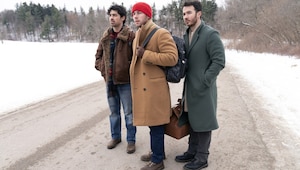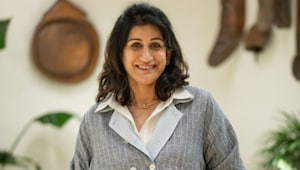Tahira Kashyap Khurrana: "People Aren't Used to Women Being in Positions of Power!”
Tahira speaks to Cosmo ED Nandini Bhalla about her battle with cancer, her endless supply of inner strength, and why accepting your flaws is the true route to self-love

Last year, Tahira released her fourth book, 12 Commandments Of Being A Woman, a tongue-in-cheek, upfront take on being a ‘celebrity wife’, her battles with depression, insecurities, and cancer, and her learnings from all of them. Prior to her book, in a TED Talk she gave in November 2019, Tahira explains why she decided to draw attention to breast cancer through social media. How, on the day she was to be discharged from the hospital, a close relative told her that nobody ever needed to know about her surgery. But she also remembered being told by her doctor that countless breast cancer cases go untreated—and cause deaths—because women are embarrassed to get their breasts examined. “It was as if the entire family’s pride, somehow, lay in the women’s breasts,” she says in the talk.
And so, Tahira began using her voice to deliver messages of hope, resilience, and healing, to countless women suffering in silence. “I really wanted to spread two things: awareness about early breast cancer detection, and self-love,” she says. At home, a recovering Tahira was faced with some reservation from her parents and her seven-year-old son, Virajveer. She shares, “When my son saw me bald, he began screaming and crying, ‘What have you done? I’ve only seen men go bald, never a woman!’ And I was, like, ‘Well, now you’re looking at one!’” This is the kind of episode with the emotional power to break down many a sensitive mother and woman, and one can't help but admire Tahira for how she handled the situation. When her son declared that he did not want her to meet his friends without a wig or cap on, Tahira followed him to the play area with “a nice, shiny, bald head”. She met his friends, and thus normalised the situation. “I think I changed one thing that day," she says. "I redefined 'normal' and 'beautiful', at least for my son.”
Nandini Bhalla: In the past, you have spoken up about your struggles with mental health, anxiety, and depression. In your lowest moments, what helped you rise again?
Tahira Kashyap Khurrana: "I was battling a lot of anxiety attacks and sadness, but since I never sought medical help, I don’t call it depression. However, it most certainly was that. You don’t just go through endless anxiety attacks or get used to crying for five to six hours every single day. The first thing one should do in a similar situation is to seek help. Sadly, I didn’t do that. But I was lucky to have come across Nichiren Buddhism, and I worked really hard on myself. I worked towards becoming someone who appreciates and loves herself, because the longest relationship you will have with someone is yourself, not your parents, spouse, or children. For the rest of your life, it's going to be you, your body, your mind, and your soul—how can you be disconnected from it? I worked hard to gain awareness and appreciate everything I did, no matter how big or small. Earlier, I was extremely critical of myself; I was too much of a perfectionist. But now, even though I have more goals than ever before, I’m working from a positive perspective.
A part of the practice is to express, engage in dialogue, and communicate. It is so important to open up, even if you feel that people won’t understand you. Let the awareness kick in, that there is hope beyond the situation you're in."

NB: And how does one learn to love themselves—and their bodies—a little more?
TKK: "It’s a constant work in progress, when you start adding value to your life—not just cosmetic. Someone is always going to be more beautiful than another; it's a never-ending process. For instance, you might be thrilled that you have lost some weight, but that weight could return in a couple of days. You can’t keep up with diets for the rest of your life. The idea is to deal with our complexes and cherish individuality. And the day we are truly able to do that, we’ll also be able to not just cherish ourselves, but everyone and everything around us! It’s about attributing value to our uniqueness. There is no rat race—what you can do, I can’t, and vice versa. We need to respect and accept that. Instead of feeling sad or jealous at someone’s success, you should root for them! This realisation—that we are all connected—dawned on me a few years ago, and it has made me a much happier version of myself."
NB: You went public about your battle with cancer, and inspired so many women. But there are still so many who are afraid to talk about it—or even seek medical help. Why do you think there is so much stigma around breast cancer?
TKK: "We are lucky that we come from privileged setups. We have the education, access to medical infrastructure, and in most cases, liberal-minded family and friends. When I was going through this ordeal, I never saw it as something I had to share with others. For me, it was a health problem—a lot of people go through other health problems, and not everyone comes forward and discloses it. And in many ways, I saw my cancer as a golden chance to improve myself, to transform into my best version. I saw it as a situation that hadn’t come to take something from me, but to give something to me.
But through my journey and regular visits to the doctor, I came across other people's stories, and what shocked me was that so many women held themselves guilty! They actually felt guilty about falling sick! There is this stigma and taboo associated with a standard medical procedure like getting your breasts checked by a physician. And these are the things we need to speak up about! We live in a patriarchal setup where we constantly fight shame and embarrassment. In some joint families, a woman doesn’t even know whom to turn to, if she finds a lump in her breast. It’s all connected, which is why it’s important to inform and empower women so that they become their own decision-makers.
My doctor told me that so many cases had advanced to a terribly dangerous stage because of the shame associated with a medical exam—the idea of not letting anyone touch a woman’s breast is obnoxious! It can’t come at the cost of someone’s health and life! After learning all this, I felt that my journey had to be shared. I spoke about it because early breast cancer detection can save someone's life!"

NB: Where do you get your inner strength from?
TKK: "I derive my strength from my practice, it all starts from there. At the end of the day, it’s just about empowering yourself, so it could be any philosophy, value system, or guidance that makes you in-charge of your life, and enables you to be an active participant and not just a bystander. Any philosophy that does that, can give you a lot of hope, power, and courage. For me, my practice really helped me to tap into the depths of my being when it came to letting my courage come to the surface."
NB: You've said in the past that your experience with cancer felt as if you had been given a chance to start over. What are some changes that you made, at the time?
TKK: "Honestly, the change happened two years before I was diagnosed with cancer. I am grateful because I was working hard on my faith and my practice, so when the cancer was detected, I embraced and accepted it. Like I said earlier, if you are to embrace your opportunities, you should also embrace your obstacles.
Of course, I had to face the physical changes—the pain of chemotherapy was very much there, but so was the intensity of suffering changes with your mental determination. So, I determined that I would keep working through my treatment, and I did just that. I forgot my pain when I was working and was occupied, and it was only when I came home that the pain resurfaced. When I decided to be productive, I didn’t give myself the time to feel the suffering. In life, you’ll always have issues; it’s better to see these ‘issues’ as opportunities to expand yourself."

NB: What do women need to do more of, according to you?
TKK: "They need to love themselves a bit more. Actually, I won’t say ‘they’, I’ll say ‘we’, since we all are works in progress. We need to value ourselves more. We need to add a lot more significance to what we do—each one of us has a mission, we just need to take charge of it to lead happy and fulfilling lives."
NB: And what do women need to do less of?
TKK: "We need to stop living by the stereotypes that have been forced upon us. We don’t need to fit any mould; we are unique individuals, and that should be celebrated! There is no need to be perfect moms, working women, or homemakers who should be able to handle 10 different things at the same time. There should be room to falter and mess up."
NB: If you could go back in time and give advice to your younger self, what would you tell her?
TKK: "It's something we discussed earlier, about not trying to hide your complexes or issues. I wish I could tell my younger self, ‘Be aware of your faults; you can deal with them in the most loving manner. You don’t always need to be so harsh on yourself. There are going to be issues and problems for the rest of your life, but how you perceive those issues will really alter your experience’. I wish this awareness could have set in sooner."
NB: When was the last time when you were brave?
TKK: "Each time we take a decision to not let our situations get the better of us, we are being courageous. Each time we choose to not begrudge a testing state or situation, we are being courageous. When does this happen? It happens in every moment of our lives."
more from Celebrity

Taylor Swift's exact workout that kept her stage ready for the Eras Tour

The best makeup tonics to upgrade your skincare and makeup routine

Scents that make staying in feel like a winter wonderland

'Bridgerton' season 4 trailer: Benedict and Sophie are ready to serve a Cinderella-esque romance

“Pebbling” is the non-toxic, genuinely adorable dating trend we all needed

Is 'future faking' the new gaslighting? Decoding this new dating trend

Bad at gifting? Check out these stocking stuffer ideas based on each zodiac sign

15 new Christmas movies you might want to add to your 2025 holiday watch list

Why glycolic acid is your skin's best friend for the winter season

How training for a marathon became the most honest conversation I have ever had with myself
